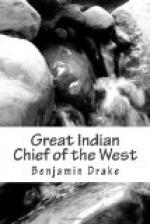Jackson and Black Hawk, the latter is represented
to have said, “I am a man and you are another.”
In the course of their interview, the President informed
him that he and his companions must proceed on the
following day to Fortress Monroe, there to remain,
until the conduct of their people at home was such
as to justify their being set at liberty. In
reply to this, the Prophet said, “We expected
to return immediately to our people. The war in
which we have been involved was occasioned by our
attempting to raise provisions on our own lands, or
where we thought we had a right so to do. We have
lost many of our people, as well as the whites.
Our tribes and families are now exposed to the attacks
of our enemies, the Sioux, and the Menominies.
We hope, therefore, to be permitted to return home
to take care of them.” Black Hawk concluded
his address to the President, which embraced a history
of the late war, by saying, “We did not expect
to conquer the whites, no. They had too many
houses, too many men. I took up the hatchet,
for my part, to revenge injuries which my people could
no longer endure. Had I borne them longer without
striking, my people would have said, Black Hawk is
a woman. He is too old to be a chief—he
is no Sac. These reflections caused me to raise
the war-whoop. I say no more of it; it is known
to you. Keokuk once was here; you took him by
the hand, and when he wished to return to his home,
you were willing. Black Hawk expects, that, like
Keokuk, we shall be permitted to return too.”
The President gave them assurances that their women
and children should be protected from the Sioux and
the Menominies, and that so soon as he was satisfied
that peace was restored on the frontiers, they should
be permitted to return home.
On the 26th of April, they set off for Fortress Monroe,
at Old Point Comfort, where they remained until the
fourth of June, when, an order was received, from
the President, by the commanding officer, for the
liberation of the Indian captives. The kind treatment
of the prisoners by Colonel Eustis, then in command
at Fortress Monroe, had won greatly upon their regard.
When about to depart, Black Hawk waited upon the Colonel,
and said;—
“Brother, I have come on my own part, and in
behalf of my companions, to bid you farewell.
Our great father has at length been pleased to permit
us to return to our hunting grounds. We have buried
the tomahawk, and the sound of the rifle will hereafter
only bring death to the deer and the buffalo.
Brother, you have treated the red men very kindly.
Your squaws have made them presents, and you have
given them plenty to eat and drink. The memory
of your friendship will remain till the Great Spirit
says it is time for Black Hawk to sing his death-song.
Brother, your houses are as numerous as the leaves
upon the trees, and your young warriors, like the
sands upon the shore of the big lake that rolls before
us. The red man has but few houses, and few warriors,




